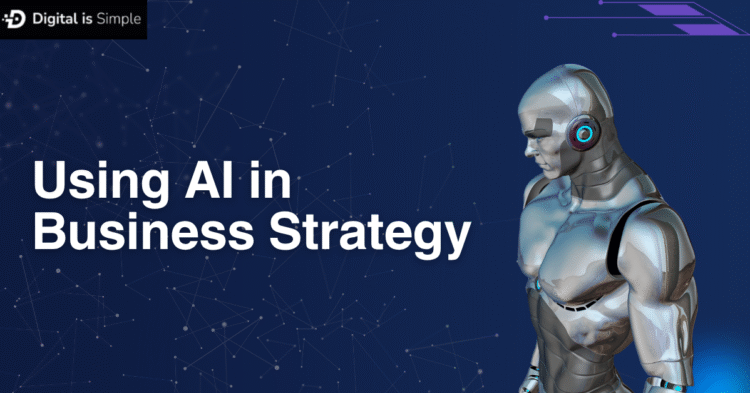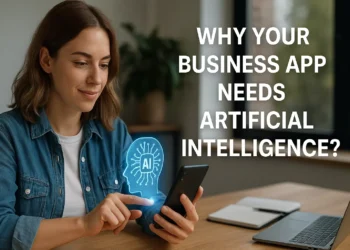The modern world is very dynamic, and a business can never afford to use intuition as the sole tool. The world is surrounded by data and understanding its meaning is among the most important aspects of keeping up. Here is where Artificial Intelligence (AI) comes in, to assist organizations in transforming raw data into actionable insights that will lead to smarter, faster, and more strategic decision-making.
What Is AI in Business Strategy?
AI in business strategy refers to the adoption of technologies, such as machine learning, natural language processing, and predictive analytics in business planning. Instead of relying on the power of human intuition, businesses may now rely on AI to determine trends, forecast results, and streamline workflows.
AI helps companies:
- Quick analysis of large data sets.
- Establish new market opportunities.
- Make customer experiences personally.
- Improve decision accuracy.
When machine intelligence is combined with human creativity, companies are able to change their strategic approaches and competition within their industry.
Why Are Businesses Welcoming AI in Business Strategies?
The contemporary business world is dynamic and complicated and driven by data. The use of manual data analysis or intuition is no longer effective when decisions are required to be taken on the spot.
This is the reason why organizations are adopting AI to enhance their decision-making:
Data Overload: AI is used to make sense of large amounts of data.
Speed: AI tools have the ability to process patterns as fast as any human team.
Precision: AI minimizes human error in planning and prediction.
Let’s have a look at the latest market trends of AI in business strategy for smarter decision-making:
Key AI Adoption Statistics (2025)
| Area | Statistic | Source |
| Global AI Adoption | Over 90% of companies are either using or exploring AI. | Statista |
| Business Impact | AI is driving innovation, R&D acceleration, and transformation. | McKinsey & QuantumBlack |
| Future Investments | 92% of companies plan to increase AI spending in 3 years. | Statista & McKinsey |
| AI Market Growth | Valued around $244 billion in 2025 and growing rapidly. | Statista |
Key Applications of AI in Business Strategy

The use of AI is not confined to any department alone; it cuts across all corners of a business. The following are the most influential methods in which AI is applied in business strategies today.
1. Market and Customer Insights
AI is used to process customer data in order to discover patterns, preferences, and behaviors. This helps businesses:
- Predict buying trends.
- Personalize recommendations.
- Enhance customer experience by marketing specifically.
In the case of eCommerce platforms, AI tools use customer history to suggest products, which raises the conversion rates and loyalty.
2. Financial Forecasting and Risk Management
Predictive analytics based on AI make the budgeting and financial planning processes more accurate. Companies use AI to:
- Early detection of financial risks.
- Identify transaction fraud.
- Test what-if cases to deal with market changes.
Financial teams are currently using AI models in making evidence-based decisions rather than guesses.
3. Operations Optimization
With the help of AI, business processes are simplified, as it automates routine activities and makes the logistics more efficient.
Examples include:
- Manufacturing predictive maintenance.
- Optimization of routes in logistics.
- Supply chain demand forecasting.
The outcome is reduced cost, decreased delays and enhanced resource allocation.
4. Talent Management and Human Resources
HR departments are applying AI to:
- Hiring the best employees within a shorter duration.
- Employee turnover prediction.
- Increasing interaction and retention.
Through the workforce data, AI facilitates improved hiring and long-term planning.
5. Strategic Decision Support
Real-time data visualization and insights are no longer provided by the executives relying on AI-driven dashboards. These tools point out trends and identify anomalies as well as simulate the results- equipping leaders to make informed and timely decisions.
Benefits of Using AI in Business Strategy
| Benefit | Impact on Business |
| Faster Decision-Making | Real-time analytics enable instant strategic adjustments. |
| Improved Accuracy | AI minimizes human bias and prediction errors. |
| Predictive Insights | Businesses can anticipate market changes before they occur. |
| Cost Optimization | Automation reduces operational costs significantly. |
| Competitive Advantage | Early AI adopters stay ahead through innovation and efficiency. |
Difficulties and Threats of AI Implementation
Although AI comes with enormous advantages, organizations have difficulties in the process of adoption:
- Data Privacy & Ethics: Data could be misused or mishandled; this aspect will hurt brand confidence.
- Infrastructure Requirement: AI relies on quality and combined systems of data.
- Employee Resistance: Teams can feel that AI is stealing jobs.
- Excessive dependence on Automation: The human aspect should still be applied in decision-making to have a balance between logic and compassion.
Pro Tip: The implementation of AI can always be successful only by balancing the automation and human judgement.
How to Implement AI in Your Business Strategy?
The use of AI is not a single move; it needs to be properly planned and incorporated slowly.
Step 1: State Your Business Objectives
Determine where AI can be used to resolve actual problems in marketing, operations, or finance. Target specific results such as reduction of costs or improvement in forecasting.
Step 2: Data Collection and Preparation of Quality Data
The quality of AI can only be as good as the data it is trained on. Data integration and cleansing should be invested in to achieve correct results.
Step 3: Select the appropriate AI Tools or partners
You can contact technology providers that provide services of AI development or create your own AI solutions, which can be specific to your requirements.
Step 4: Go Small and Grow Slower
Start with pilot projects—test and learn first and then go wider through departments.
Step 5: Establish a Culture of Data
Educate your staff, foster AI awareness, and foster partnership between business executives and data scientists.
Read also: The Impact of AI on Software Development: Smarter Coding, Faster Delivery
Real-World Examples of AI in Business Strategy
| Company | Use of AI | Result |
| Amazon | Inventory and pricing predictive analytics. | Reduced stockouts, improved customer satisfaction. |
| Netflix | Artificial intelligence and content strategy. | Increased engagement and reduced churn. |
| Coca-Cola | Artificial intelligence marketing and supply network optimization. | Better campaign performance and efficient logistics. |
The Future of AI in Strategic Decision-Making
The future step of AI is regarding autonomous decision systems, explainable AI, and increased human-AI cooperation.
The business strategy in the future will be based on:
- Generative AI in idea generation and innovation.
- AI-based R&D to accelerate the product development.
- Smart predicting of more robust business models.
According to McKinsey & QuantumBlack, AI is not a mere concern of automation anymore, but it is core to innovation, acceleration of RD, and business model transformation.
Conclusion
AI is transforming the process of planning, decision-making, and expansion for businesses. It has made it hard to ignore its contribution to strategy in terms of enhancing efficiency as well as generating new opportunities.
According to the reports given by Statista, the AI market in 2025 will have a value of more than 244 billion, something that signifies that companies are putting large sums of money into smarter and data-driven futures.
You haven’t started yet? Now is the right time to include AI in your strategy — whether through AI development services or a custom AI solution designed for your goals. Smart, AI-powered decisions will define the future for businesses that act faster.


















